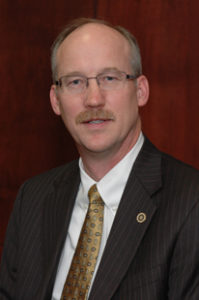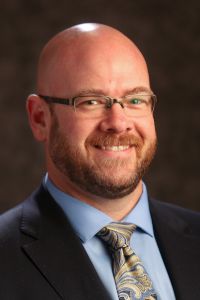A proposed federal vaccine mandate could eventually cover the state’s regional universities as well as its community and technical colleges, the top executive for the Kansas Board of Regents told lawmakers Friday.
Blake Flanders, president and CEO for the regents, alerted lawmakers that the U.S. Department of Education was expected to soon issue guidance that could determine whether federal financial aid constitutes a contract.
As a result, the federal vaccine mandate could apply to regional universities such as Pittsburg State, Fort Hays State and Emporia State as well as the 19 community colleges and six technical colleges.
The department’s guidance is due out in the next week or two, he said. Officials stressed that there was no requirement in place at community colleges.

Flanders’ comments came during the first day of hearings held by a special committee studying ways the state can fight back against the proposed federal vaccine requirement as well as any other federal mandates stemming from the pandemic.
About a week ago, the state’s three biggest universities — the University of Kansas, Kansas State and Wichita State — announced they would require their employees to be vaccinated so the schools would comply with the forthcoming federal mandate.
They followed the guidance from the Kansas Board of Regents that said federal contractors are covered by the executive order President Joe Biden issued Sept. 9 mandating vaccines.
Flanders told lawmakers that more than $1 billion in federal contracts with the University of Kansas, Kansas State and Wichita State would have been at risk if a vaccine mandate wasn’t implemented.
The state’s universities have a number of federal contracts with the Department of Justice, the Department of Defense, the Department of Health and Human Services, Department of Energy and the Department of Education, among others.
Flanders said Wichita State had about $132 million in federal contracts, K-State had $155 million and KU had more than $900 million.
“We do expect that if we lost these contracts, they would just go to other states,” Flanders told the legislative committee.
“If you were a professor working with the agency, you may just go apply at another university in another state and take that research with you.”
A spokesman for the Board of Regents said Friday that the regional universities in Pittsburg, Hays and Emporia had determined they do not have federal contracts that would lead to the vaccine mandate.
“If the U.S. Department of Education rules that institutions receiving federal student financial aid are subject to the federal vaccine requirement, that would impact all institutions in the system,” Matt Keith said in an email.
Republican lawmakers questioned Flanders about the applications for anyone seeking an exemption to the vaccine mandate.
They complained that some of the applications were so burdensome that it would infringe on employees’ freedom of religion.
Republican state Rep. Stephen Owens of Hesston specifically pointed to the exemption application from K-State, which asks for someone to explain what conditions or medical circumstances would make the vaccine unsafe.
It also would require someone to explain how complying with the vaccination requirement would substantially burden their freedom to exercise their faith.
“As I look at this document,” Owens said, “it quite literally requires you to bear your soul and dive deep into your religious beliefs, your history.”
Citing guidance from the Equal Employment Opportunity Commission, Owens said that federal law requires an employer to assume that a request for a religious accommodation is based on a sincerely held religious belief.
He said the law only allows for employers to make a limited inquiry into an employee’s basis for seeking a religious accommodation.

“It appears to me that a three-page document certainly isn’t limited in nature and certainly doesn’t operate under the assumption that these accommodations should be based on that sincerely held religious belief,” Owens said.
“My concern, quite specifically, is that by asking for all of this information, you’re actually creating a situation where you’re in violation of religious discrimination in lieu of simply getting the information you need,” he said.
Flanders said schools are under an aggressive timeline to implement the vaccine mandate. They want all employees vaccinated by Dec. 8.
“As we receive information, we can make adjustments to the forms,” Flanders said. “We’re just trying our best to implement this.”
Republican state Rep. Brenda Landwehr of Wichita urged the Board of Regents and the state universities to review the content of the application for the religious and medical vaccine exemptions.
“I think they have actually overstepped some major privacy bounds,” Landwehr said.
“It’s definitely something that I think at some point that this committee is going to definitely going to have too take a look at,” she said.
“It would be nice to see this process simplified,” she said. “I don’t think employees should be asked some of these questions.”
Owens praised the Wichita State application as being the most simple when compared to applications for vaccine exemptions at K-State and the University of Kansas.
The Wichita State application only asks someone about the nature of their religious belief and why they should be exempted from the vaccine mandate.
“To me, that is very clear and very straightforward and certainly not as an intrusive as what I am seeing that has been deliverd to us KU and K-State,” he said.














